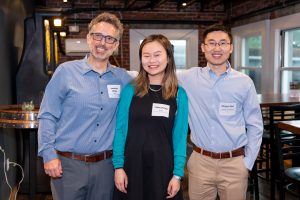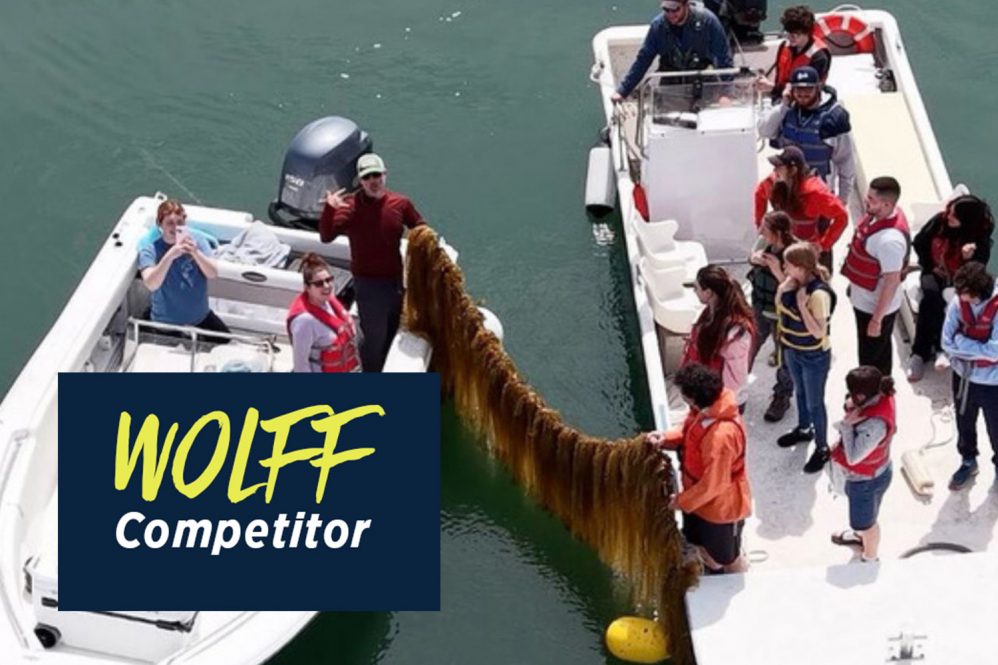When you visit your favorite sandwich, donut, or pizza shop next year, UConn Ph.D. candidate Yidan Zhang hopes you’ll be leaving with more than just good food. She wants you to also get a healthier food wrapper to carry it home.
Zhang is CEO of a startup called SeaSol Technologies, Inc. (DBA SeaSol), which is converting seaweed into a functional coating that makes food packaging compostable and high performance. The SeaSol team has developed a low-cost process that pares down the seaweed conversion process from 14 steps to one.
The coating can be applied to paper, replacing the plastic that currently lines food wrappers. The seaweed-coating has no odor, doesn’t impact the taste of food, and has a texture similar to uncoated paper, but provides a barrier to food spill.

“Currently the biorefinery process takes a lot of steps and is expensive and time consuming. We can simplify it to a one-step process which makes the final product low in cost for the first time,” says Zhang, who has been working on this project for three years.
The technology not only prevents exposure to microplastics for the consumer but also creates a biodegradable package. The SeaSol team is now demonstrating the feasibility of its patent-pending work and running trials with paper manufacturers.
SeaSol’s leadership team also includes Mingyu Qiao, a professor of innovation and entrepreneurship in the Department of Nutritional Sciences in the College of Agriculture, Health and Natural Resources, and Jon McGee, owner of a seaweed farm in Guilford, who spent a significant portion of his career in the packaging industry.
Wolff Event Will Also Showcase 40 Additional UConn-Grown Businesses
Sea Sol is one of five UConn-affiliated startups competing in the Wolff New Venture Competition on Oct. 23 in Hartford. Now in its 10th year, the event is hosted by the Connecticut Center for Entrepreneurship and Innovation (CCEI). The competition will award more than $150,000 in prize money, including $30,000 for the first-place finisher.
The event, considered the School of Business’ pinnacle entrepreneurship challenge, is open to the public to attend. Along with the pitch competition, the event will also feature a startup showcase and a prominent keynote speaker.
“This year we opened the startup showcase up to all UConn-affiliated ventures, and now we’ll have more than 40 startups represented. It’s a chance for the entire community to see the breadth of innovation that’s happening across the university,” says Alycia Chrosniak, CCEI’s assistant director of brand & venture development.
Solution to Environmental, Social Challenges
Zhang earned a bachelor’s degree in polymer/plastics engineering in China, a master’s in materials science from Cornell, and is completing a Ph.D. in foods, nutrition, and wellness at UConn.
“Yidan’s story is a powerful example of innovation at the intersection of food, agriculture, and materials science,’’ Qiao says. “Her work transcends disciplinary and institutional boundaries, is driven by real-world challenges, and is firmly rooted in experiential, hands-on learning. It showcases the transformative potential of convergence research to develop impactful, sustainable solutions to some of today’s most pressing environmental and societal challenges.’’
McGee says the team is very collegial and members motivate each other to succeed.
“We challenge each other to keep moving forward, we keep progressing,’’ McGee says.
Summer Fellowship Accelerator: Ideas We Had Never Considered
CCEI selected SeaSol to participate in its Summer Fellowship Accelerator this year, and all three executives attended. The eight-week program provides intensive startup support through workshops, mentorship, pro-bono services and $15,000 in non-dilutive funding. The program helps fast-track the entrepreneurs with advice to grow their businesses and warnings about common pitfalls.
“To me, almost everything was new,’’ Zhang says. “The businesses participating in the accelerator were all very different from each other, but we got helpful feedback from the expert mentors and also from the cohort. Everyone had very different perspectives through the eyes of scientists, engineers, working moms, a chef, and a doctor. Their backgrounds were so diverse, and they offered ideas we had never considered.’’
If they win the $30,000 Wolff grand prize, SeaSol will spend the money on additional trials and to attend conferences and trade shows to promote their product. All of the seaweed that SeaSol uses is cultured and grown regionally.
Trying to Solve an Environmental Challenge
McGee says that when he presented the SeaSol invention at a recent conference in Seattle, it drew a positive response.
“People loved the idea that seaweed, not plastic, was coming in contact with their food; that the material is biodegradable, that we aren’t using a petrochemical, and that it is ocean-friendly,’’ he says.
“It’s really important to society that we get rid of this plastic that is clogging our oceans,’’ McGee says. “Seaweed is very compelling, for all the right reasons. It is a regenerative resource that actually pulls nitrogen from the water. We’re shifting from a product that was damaging in so many ways to one that is helping us. We find so many uses for it—and we can always grow more.”
The Wolff New Venture Competition will be held on Oct. 23 at The 1390 at Parkville Market in Hartford from 5 to 9 p.m. The event is free to attend and all are welcome, but pre-registration is required at https://luma.com/oi5l7nfo.
The Wolff New Venture Competition is supported thanks to the generosity of the Wolff Family Fund for Strategic Entrepreneurship, as well as wiggin(x), Fiondella, Milone & LaSaracina LLP, Sardilli Produce and Dairy Co., Revyrie, Prime Materials Recovery Inc., Baystate Financial, Webster Bank, Big Bang, Mark and Jamie Summers, Eric Marziali, Bob and Linda Delisle, Dick and Carol Stewart and Event Resources.



